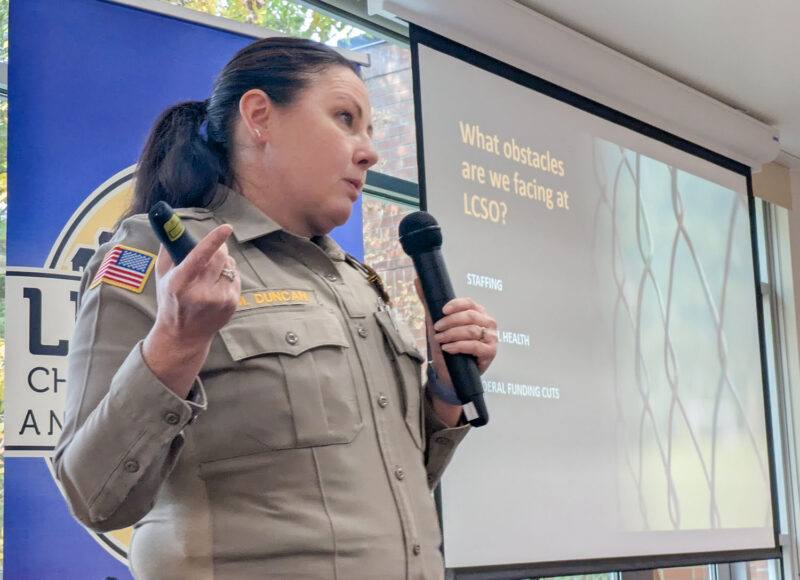Sheriff Michelle Duncan, of Linn County Sheriff’s Office, indicated they may have to lay people off in three or four years if they are not able to secure the 10-cent raise in a renewed levy, and that’s if a second levy measure attempt at the current $2.98 rate passes.
During a forum lunch by the Lebanon Chamber of Commerce on Oct. 31, Duncan presented an overview of the work they do at LCSO, and explained how the levy on this year’s ballot would help them continue that work.
The LCSO budget for the current fiscal year is $54 million. The General Fund from base county taxes makes up 12% of the budget. Revenue from contracts, grants, fees and other streams makes up 35%. It’s the four-year levy that provides 53% of the LCSO working funds.
Duncan said the levy helps fund every aspect at the LCSO, as well as emergency management (disasters, planning), search and rescue with increased medical components, body cameras, the district attorney’s office, and the Juvenile Department.
For those living in a municipality with police service, Duncan reminded the audience that not only does the Sheriff’s Office provide a jail for all inmates, but it also assists the other agencies as needed.
Four years ago the county approved a levy supporting the LCSO at $2.98 per $1,000 of assessed value. It will end in June 2026. Duncan said they are asking for a renewal of that levy for another four years with an increase of 10 cents, at $3.08 per $1,000.
Part of the need for the increase relates to the need for staff who will seek employment at LCSO instead of another agency where pay is better.
“To get cops to stay at our agency, we’ve got to be able to pay them at least a competitive wage,” Duncan said.
In answer to a question, Duncan pointed out that being able to find new hires is also becoming more difficult as more and more people use marijuana, which is still a violation of federal law. Furthermore, more of the younger generations are growing up believing it’s okay to make poor choices, or they soon realize they cannot handle the traumatic experiences they may be faced with in the course of the job.
The levy would also “enhance” the emergency management and search and rescue programs.
If the November 2025 levy request is not approved, Duncan said they would have one more opportunity in May 2026, just one month before the current levy ends, to ask again; they would likely ask to renew at the current $2.98 rate.
“We will all be super nervous,” she said. “I’ll be issuing pink slips to our folks.”
Duncan said she’s looked over the budget for the next four years multiple times and taken into consideration the projected income from new housing and growth.
“We usually project pretty conservatively because the last thing I want to do is be laying off people at the end of the year,” she said. “The reality is, we’ve looked at all the numbers and the projected growth over the next four years, (and) I will be cutting positions in year three and four. We would be about two or three million short of where we believe we would need to be.”
Current operations
Unlike some counties, Linn County operates 24-hour patrols and they answer every call.
“That’s getting harder and harder in law enforcement, and there’s a lot of agencies that don’t,” she said.
Many agencies, especially in larger districts, do not have the resources to investigate, for example, instances when cars are broken into. But LCSO still answers all calls. Duncan also finds it important to continue using “a live person to answer your call,” as opposed to using a phone tree, which is becoming more commonplace.
 In 2024, LCSO answered 35,583 calls for service, took 5,298 reports, made 5,430 arrests, and issued 2,894 traffic citations and 3,606 warnings. They also processed 5,429 protective orders and subpoenas, and more than 16,000 concealed handgun licenses. Dispatch answered about 62,000 911 calls last year.
In 2024, LCSO answered 35,583 calls for service, took 5,298 reports, made 5,430 arrests, and issued 2,894 traffic citations and 3,606 warnings. They also processed 5,429 protective orders and subpoenas, and more than 16,000 concealed handgun licenses. Dispatch answered about 62,000 911 calls last year.
With the 231 beds available, LCSO processed 4,060 inmates last year – 300 more than in 2023.
“There’s a huge mental health crisis, not only in our communities, but in particular, in our jails,” Duncan said. “That’s one of those things we’re trying to manage that is newer in probably the last five to 10 years.”
What’s more, as cases involving female criminals rise, the limited bedding for females makes it harder to keep all of them off the streets. Duncan expects a restructuring and renovating project to break ground in December that will provide more beds for females.
One other current project LCSO is focusing on is to equip patrol and corrections officers with body cameras.
“We are currently about the only agency in this county, if not the valley, that doesn’t have body cams,” Duncan said.
Other obstacles LCSO faces include staffing shortage, mental health and federal funding cuts.
On a side note, Duncan explained that federal revenue streams supporting law enforcement may require the agencies to provide support to ICE, yet the funding is passed through the State of Oregon, which prohibits the support of ICE due to its sanctuary state status.
As a result of the conflicting requirements, which ultimately means agencies are violating one law or the other, Marion County has filed a declarative relief – asking a judge to decide which law to abide by.
LCSO, alongside other counties, joined Marion County in the quest for an answer.
Duncan shared one of her frustrations with another recent law that makes her job harder. Referring to Oregon’s more recent expanded expungement laws, she now sees felons getting multiple convictions expunged. The law also makes background checks for employers questionable.
Duncan gave an example of an unnamed resident who recently had 25 drug and property crime felonies expunged. He has since committed another crime, but the district attorney cannot see his past convictions, which otherwise may have allowed the DA to go for stiffer sentencing.
“Secondly, I had to give him a concealed handgun license,” Duncan said. “I shouldn’t be giving a multi-felon a license. He can’t purchase a gun, but I can give him a license to carry one concealed.”





